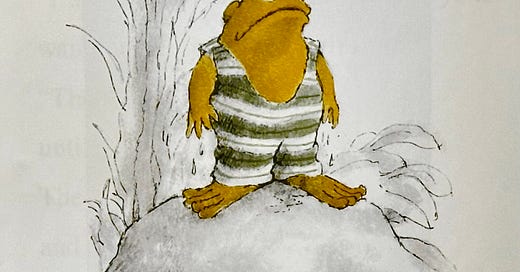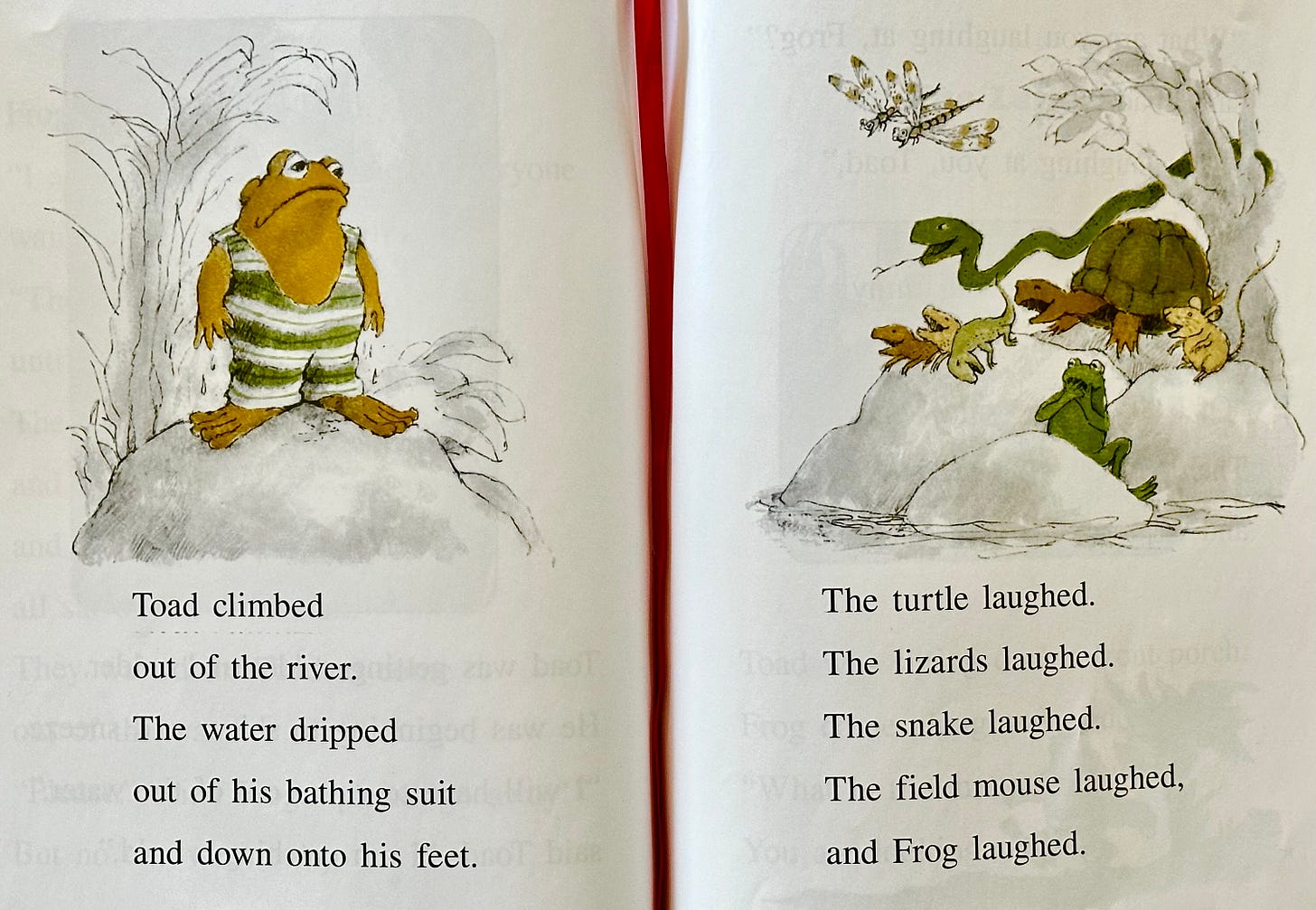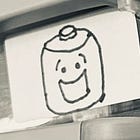Stolen Autism Valor Feeling
In which I struggle to claim a diagnosis and wear a special pin even though I desperately want to wear a special pin
A little background: I’m a 42-year-old, straight, white, cis male. My pronouns are He/him. I live in a nice house in the suburbs of Washington, D.C. I’m a government contractor working in IT. I’m married and have two young children and a dog named Mochi and an aquarium full of Kamaka rainbowfish, Melanotaenia kamaka. So, you know, I have gobs of privilege. This will come up later.
In October of 2024, just a week or two before my 42nd birthday, I was diagnosed with autism spectrum disorder (ASD) level 1. How I wound up getting tested at this stage of life is an interesting story, but not my focus today.
My focus today is how that diagnosis made me feel—more specifically, the degree to which I permitted myself to announce those feelings to my friends, my family, and the world at large.
In the space between first wondering whether I might have ASD and the weeks following my diagnosis, I’ve felt all kinds of things. Here are a few of those things that I felt, each of which could anchor its own essay:
Anger that my parents and teachers and therapists and doctors missed this for my entire life*
The relief and joy of feeling seen
The hope that being armed with this new information might make my life a little easier
The hope that this might be the key to unlocking my depression and anxiety
The fear that it might not
The joy and pain of reframing my relationships with family members who also have ASD or who I suspect might have ASD
The joy and pain of revisiting every relationship in every category across every stage of my entire life in an attempt to gain a little insight into why those relationships were difficult for me—to better understand what went wrong
But the feeling that interests me the most right now is this: After a life of struggling to fit in—to feel like I belonged anywhere or with anyone—I’ve continued to struggle with belonging, even as I have an open invitation to join the ASD community. Rereading the previous sentence carefully, I realize that it assumes that “to struggle with belonging” is a feeling. It’s syntactically a little strange, but it’s emotionally accurate to my experience, so I’m going to leave it.
I should note that all this ASD business is still very new to me and that I’m still just getting my feet wet and learning to talk about it. I don’t mean to imply that I’ve tried to reach out to other people with ASD and felt rejected. In fact, the few people (single person) with ASD that I’ve reached out to have been (has been) warm and sympathetic and welcoming. Her name is Carrie.
At this point, it makes sense to mention why I recently joined Substack. There is one very specific reason, and it is that American hero Carrie Poppy recently set up her own space here. For thirteen years, she was one host-half of the podcast “Oh No Ross and Carrie”. In June of this year, they dropped episode 418, “Ross and Carrie Have Autistic Traits: AQ Test Edition”. In it, Carrie revealed her own ASD diagnosis to half-host Ross and to the world. I have a million things to say about this wonderful episode (Did it win the Pulitzer Prize? I don’t know! Maybe!), but for now, I’ll just note that it was one of a few things this year that led me to wonder about my own diagnosis. So, Carrie is the reason I’m here—because I want to read her work as she continues to write it and because she was brave in revealing her own diagnosis.
I slid into her DMs to wish her well and to thank her for the AQ episode. She was kind enough to ask follow-up questions about how I was doing with my own diagnosis. She also recommended Unmasking Autism: Discovering the New Faces of Neurodiversity by Devon Price, PhD.
What follows is an excerpt of a subsequent message I sent her. I considered rewriting a version of this, but I like the idea of simply excerpting it for a few reasons. Mainly, I like that it captures a bit of the way my brain works—how I build big-picture ideas out of little pieces in a way that might seem odd to allistic people. It captures how excited I can get about a new thing and how I can’t rest until I’ve totally pulled it apart and written a whole, long thing about it. I don’t think it’s disorganized. I think it’s differently organized. I’ve edited it slightly for length and clarity.
I started reading Unmasking Autism last night. I woke up just now (~4:00 a.m. EST) and reread my longer DM to you (A,B,C,D)—that one.
E) Stolen Autism Valor. You told me “don’t feel a need to edit” above. When I read that the other day, I thought, “Oh, wow, she really thinks what I have to say is interesting.” I didn’t think, “Don’t be ashamed of your autism—be yourself.” I have a feeling you meant both, but what’s interesting to me is that the latter just didn’t even occur to me—wouldn’t have occurred to me if I hadn’t just read the first fifty pages of the Price book.
So far, I find it to be very well written and insightful—thanks for the recommendation. I’m glad I’m reading it, and I’ll see it through to the end. However, I’m the white boy with trains. In many ways, I’m the stereotype of autism that Price describes as an artifact of the history of autism research and our male-, cis-, and white-focused society. So, as I’m reading, as he’s pumping the reader up to “unmask”, I’m thinking, “Oh, but he doesn’t mean me—he wants me to go duck myself.” (Fun side note about me: my swipe-to-text refuses to believe I’d ever want to tell anyone to go fuck themselves, and it always generates “duck” instead. I’ve started just leaving it as “duck”.) So anyway, I know that Dr. Devon Price doesn’t want me to go duck myself—he wants to help unmask the people with ASD who’ve been marginalized and who’ve been under-diagnosed and who’ve suffered because of that. He wants them to feel empowered to raise their hands and be counted and be treated better. That’s awesome—love that, get that. But I still find it interesting that my first response is to find myself in the exception.
Anyway, E!) The above is interesting, but it’s not quite on the topic of stolen valor. Even in Price’s book and in your ONRAC coming-out episode, I don’t think I’ve heard anyone express quite this: When I took the AQ and I got my medium-high score (I think it was 33?), I initially felt like, “Yes! I win! I’m on the team! Same team as Carrie Poppy and (probably?) David Byrne! That’s cool! Cool team! I’m going to wear a special button every day that lets people know which team I’m on!”
But then I immediately thought, “You can’t claim this,” and not just because I didn’t have a formal diagnosis yet. Even after the formal diagnosis, in turns, when I’ve considered telling people or writing about it or wearing it proudly, I stop and think “Stolen Autism Valor” and it shuts down the pride parade. A good hypothetical parallel would be that as a straight, cis man, I would want to go on The Today Show and claim queer cred because I hugged a man in college and got a little turned on by his cologne and his scratchy beard. No, Paul! You don’t get to get on a soapbox and talk about how hard autism has been for you—so many people have had such a harder time of this. Let them have their parade. Let them wear the buttons. This isn’t yours to claim.
But, of course, it is mine to claim. And I know that it is. I have a long report signed by a PhD that says I’m on the team. I know how much pain I’ve experienced because of my autism—because autism is difficult in and of itself, because I wasn’t seen by my parents and my teachers and my therapists* and my doctors for more than FOUR DECADES. That I spent most of my life hiding my natural personality to avoid being bullied and socially marginalized. That was really hard! Not to mention the comorbid diagnoses that come with their own pain and suffering. Still.
Still! “Stolen Autism Valor! Let them have their parade!” I don’t know exactly what to make of that. Could be that I’m protecting myself because it’s scary to join the team—it’s risky, and some people will judge me because of it. But that doesn’t feel quite right—I want to join the team. I have a feeling that the underpinnings of my “Stolen Autism Valor” neurosis are a little more complicated—tied up in cultural stuff that I don’t fully have my head around.
Anyway, that’s what I woke up thinking. For your awareness, as I’ve been writing this in bed, my five-month-old son has been slamming his feet in his bassinet and farting. Love it.
And that’s it! That’s the thing I’ve been feeling that I’m not sure what to do with—“Stolen Autism Valor Feeling”, which, as a person with autism, I hereby give John Darnielle of the Mountain Goats permission to title a song.
I’m sure that I can’t be the only diagnosed-later-in-life person who’s ever felt this feeling. Sure, “I’m writing this blog for my one subscriber / my friend Dan, yada, yada, yada, meme, meme, meme,” but I sincerely hope that someday this post finds its way around the ASD community. I’d love to hear other experiences with this feeling. I’d love to have help with this feeling.
*My autism wasn’t seen by my therapists until it was. Good job, current therapist!
Series Note
This inaugural post has become part of an ongoing series in which I explore each of the feelings that washed over me when I received my diagnosis of Autism Spectrum Disorder (ASD) at forty two.






Oh wow. Thank you. You expressed my main concern at this point, and my AQ was 37! Awaiting my report …
have felt all of this!!! on the one hand, i do know how hard this has been for me, but on the other hand, when i consider my relatively low support needs and such, i feel like i don’t really have grounds to talk about it. like i’m in this weird gray space between “””normal””” and someone who “””actually””” has autism. (quotes because of course that’s a horrible framing, but so says the devil on my shoulder.)